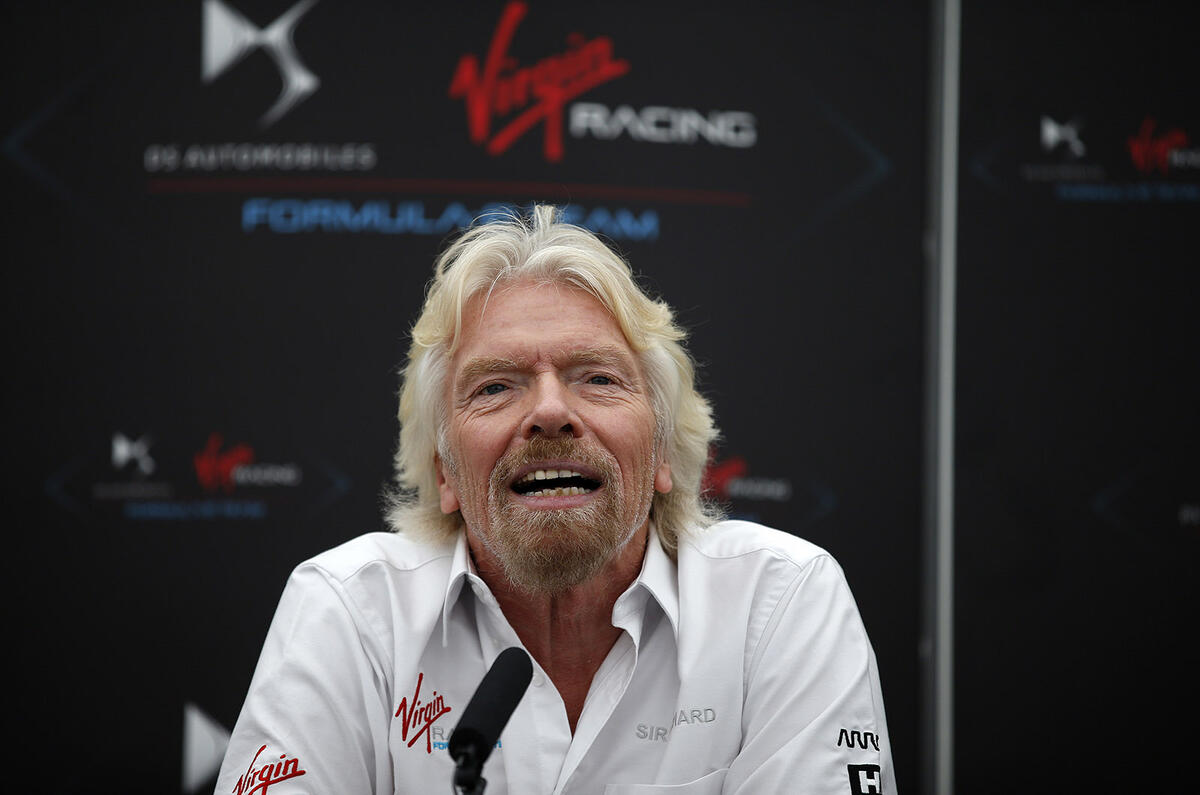Sir Richard Branson doesn’t pull his punches. In a press conference to announce his Virgin Racing team’s link-up with DS Automobiles in Formula E, he declared that the all-electric racing series would “overtake Formula 1” in terms of popularity and significance in five years.
“In the next two or three years Formula E is going to grow as quickly as clean energy is in general. I think things are going to move that rapidly now,” he added.
He didn’t stop there, making the prediction that petrol engines will be nigh-on obsolete in road cars in the year 2035.
“I’m willing to bet that in 20 years from now there will only be battery-driven new cars being built,” he said.
“What goes on inside a petrol-driven engine is really complicated, out of date and polluting. It will disappear over the next 20 years.
“Battery-driven cars are the things of the future and companies that move in that area are the ones that are going to dominate the market place.
I disagree with Branson on both counts, and although his comments have generated plenty of headlines, it must be remembered that he isn’t an expert on the intricacies of the sport.
F1, despite having some work to do to improve the show for the fans, will not become obsolete in five years; there’s far too much money sloshing about in the sport for that to happen, and the organisation behind it is extremely well-established.
And 20 years in road car terms is perhaps three model cycles, during which petrol-powered engines will continue to get ever-more frugal, especially when combined with hybrid systems.
Although Branson’s pronouncements didn’t quite convince me, there’s no doubt they were well-meaning and not without merit.
Formula E has done many things right in its first season, which draws to a close in Battersea Park, south London, tomorrow.
It has proven that battery-powered single-seaters can race wheel-to-wheel, and attracted a pretty strong field of drivers to pilot them.
It has brought many high-profile technical partners on board – McLaren, Williams, Michelin, Renault and now DS among them. The might of such companies working towards the goal of improving electric vehicle power trains and enhancing battery range could prove to be formidable.
Heck, Formula E has even pulled off what the great Bernie Ecclestone could not – taking top-level motor racing into the centre of London.
The series is still a work-in-progress, and there are still teething issues to overcome, but remember that Formula 1 remained a slightly amateurish gentleman’s sport for decades, pretty much until Ecclestone set about marketing it properly.
Formula E doesn’t have that luxury; it has to do its growing up in the full glare of publicity. I don’t reckon it will supersede F1 in five years, but with more automotive companies coming on board, it is shaping up to make an interesting alternative.




Join the debate
Add your comment
Pollution
All electric cars really achieve is to shift the emissions away from cities (ignoring a fairly marginal reduction in emissions because power stations run at a slightly higher efficency than car engines, although this gap is reducing all the time due to car manufacturers improving engine efficency) .
zzzzz-zzzz-zzzzzzz
@lamcote you spew out the
Also, as technology progresses and costs decrease you'll be able to charge your car at home using solar panels - as BMW is researching this, and surely will others.
Battery technology is improving, Tesla is sharing technology, the combustion engine should die an unceremonious and fast death for city commuting as far as I'm concerned.
And as a motorsport surely Formula E will improve.
I'm not anti-car, we all love sports cars but for basic transport we need to get our heads out of the sand.
Actually Bert, it's YOU who
"In 2035 I would be very
"In 2035 I would be very surprised to not find at least 50% of new cars being fully electric."
So half of what Sir Richard claims, then. A scenario which would make me equally as right as him, or he equally as wrong as me.
For what it is worth, I think your prediction of 50 per cent is far more credible than his.
In some quarters it is suggested that we haven't even hit peak oil production yet, so calling an absolute end to the internal combustion engine in 2035 seems a touch premature.
@Matt fair enough, but no-one
I don't care how much the internal combustion engine advances by 2035 - the truth remains it will still be heavily polluting. Yes electricity still pollutes, but at least the area of pollution is greatly reduced and is away from the working commute.
I still agree with Branson in that the combustion engine is way too complicated and inefficient (even in the best guises) for this modern world.
Yeah right
And
It would seem that the